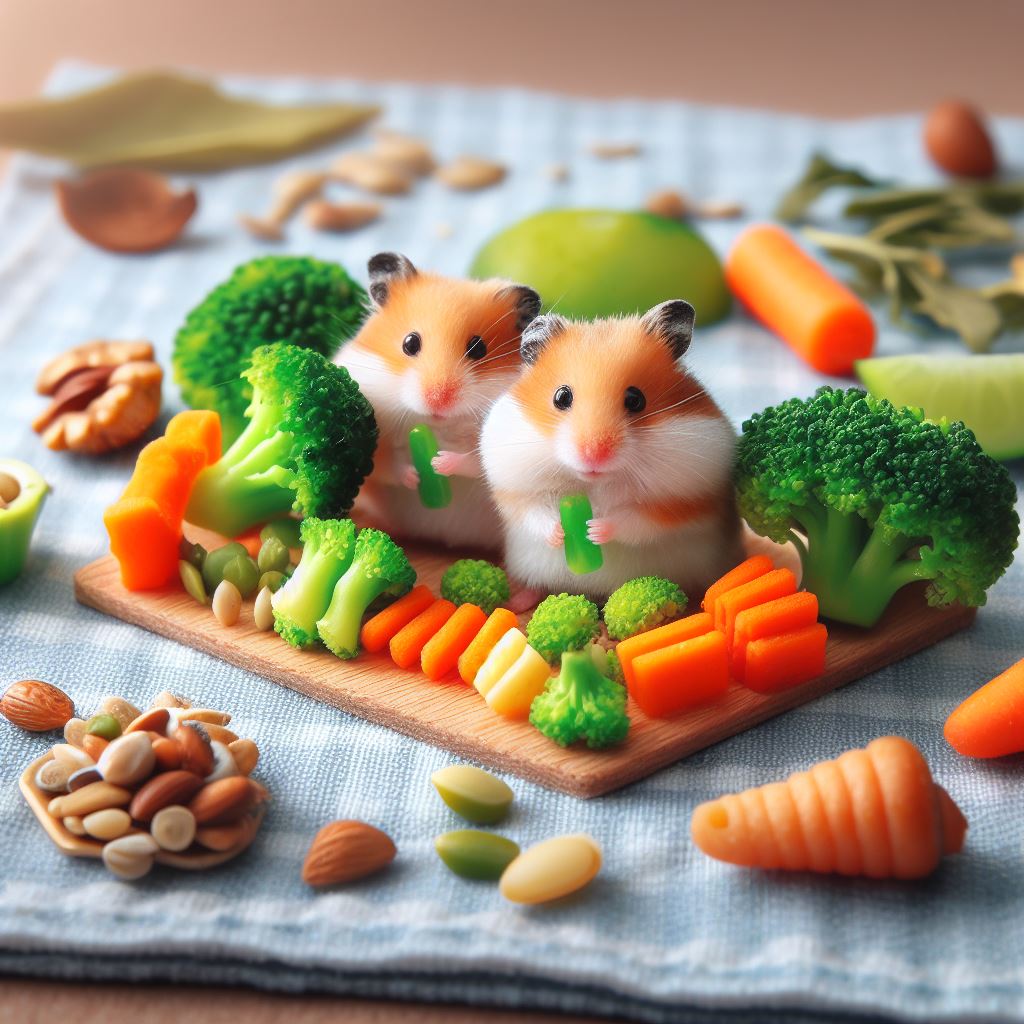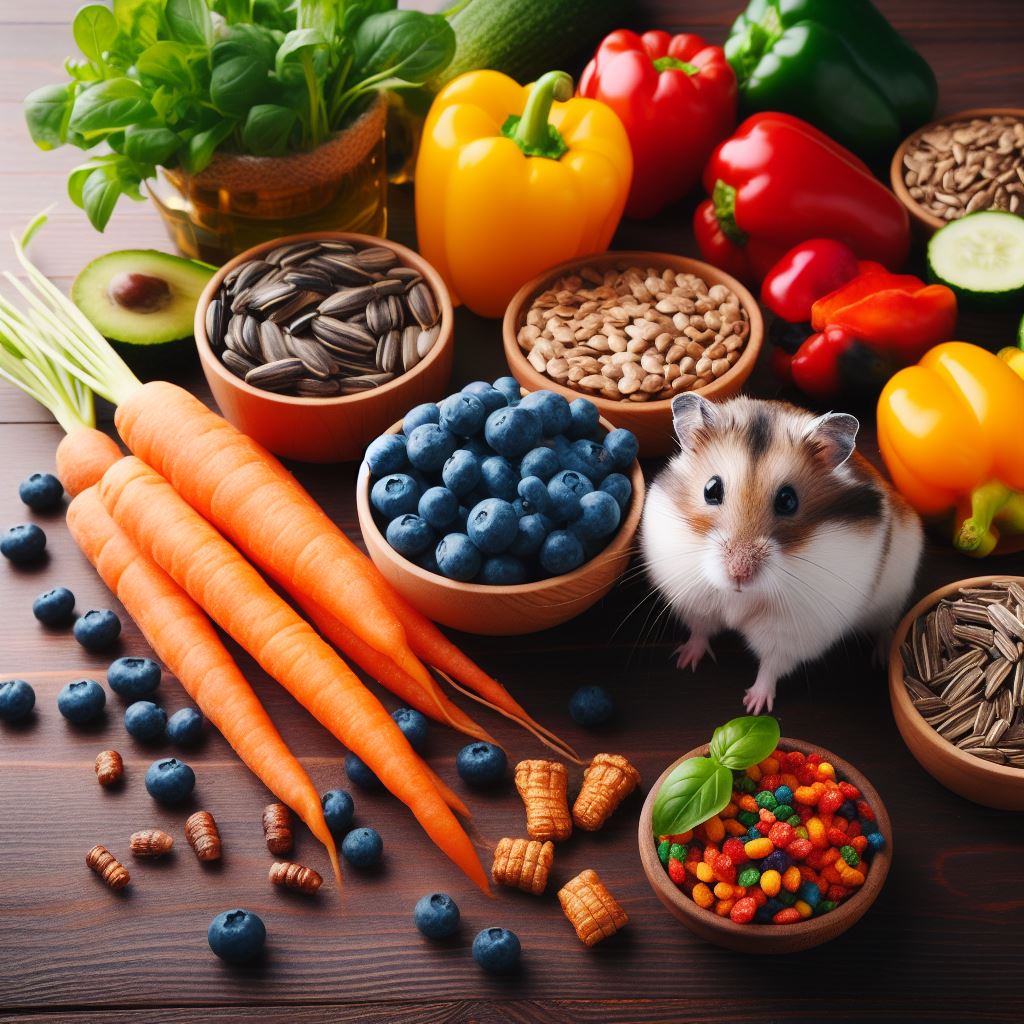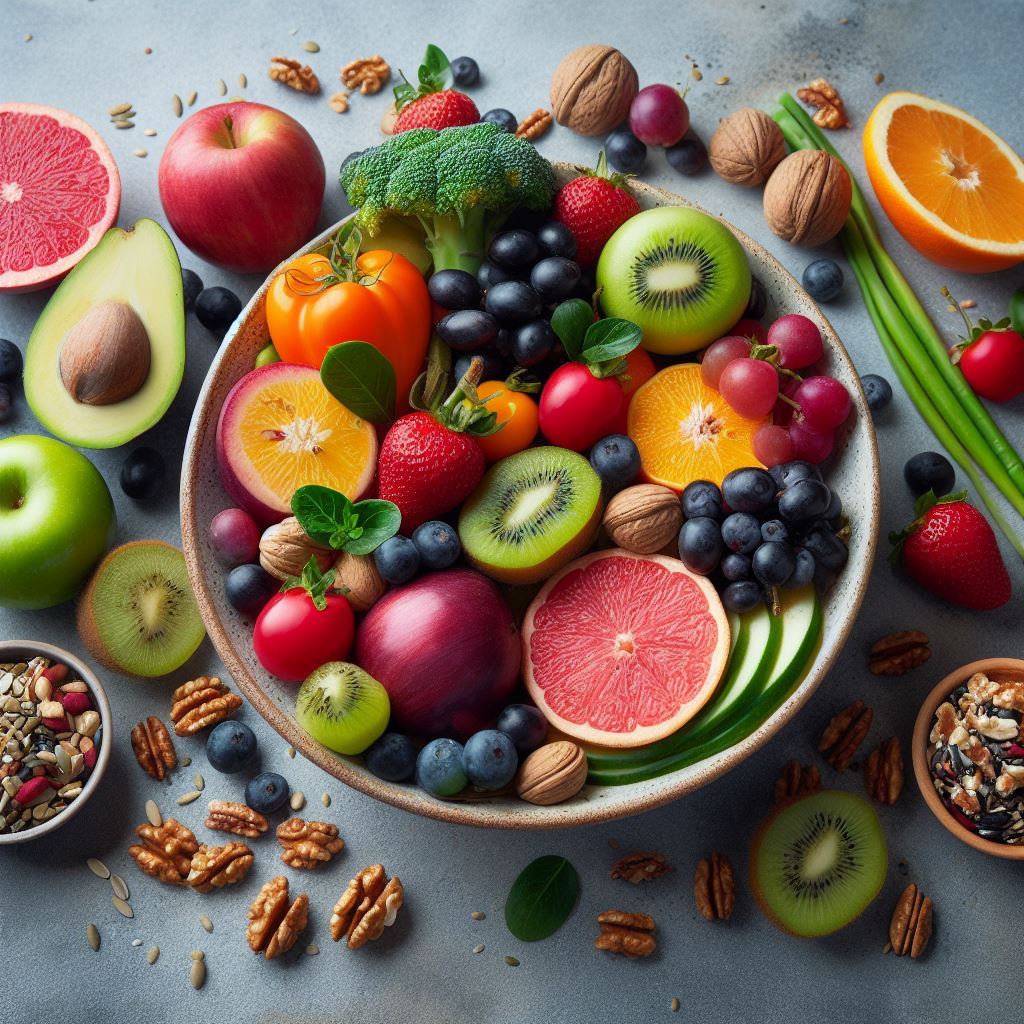Welcome to our informative article on ‘Discover the Perfect Snacks for Dwarf Hamsters.’ Ensuring the well-being and optimal health of your beloved pet is paramount, and providing them with appropriate snacks is a crucial aspect of their care.
In this article, we will delve into the importance of fiber in a dwarf hamster’s diet and provide specific recommendations for safe and nutritious snack options.
We will also discuss the significance of a balanced diet and offer valuable tips for feeding dwarf hamsters.
Stay tuned for expert insights and guidance on providing the perfect snacks for your furry friend.

The Benefits of Safe Fruits for Dwarf Hamsters
Frequently incorporating safe fruits into the diet of dwarf hamsters provides numerous benefits for their overall health and well-being.
The benefits of incorporating safe fruits in a dwarf hamster’s diet are twofold.
First, fruits are a great source of fiber, which plays a crucial role in their health and digestion. Fiber helps regulate their blood sugar levels by slowing down sugar digestion. This is particularly important for dwarf hamsters, as they are prone to blood sugar spikes.
Second, fruits provide essential vitamins and nutrients that contribute to their overall health. Fruits such as bananas, apples, blueberries, blackberries, and strawberries are safe options for dwarf hamsters. However, it is important to limit fruit consumption to once or twice a week to prevent excessive sugar intake.
Importance of Fiber in a Dwarf Hamster’s Diet
Fiber, along with being essential for a dwarf hamster’s digestive health, is also crucial for maintaining their overall well-being. Fiber-rich vegetables play a significant role in promoting digestive health in dwarf hamsters. These vegetables provide the necessary bulk for proper digestion and help prevent constipation. They also aid in maintaining a healthy weight by promoting a feeling of fullness.
Here is a table showcasing some fiber-rich vegetables that are beneficial for dwarf hamsters:
| Vegetable | Fiber Content | Benefits |
| Broccoli | High | Promotes digestion |
| Carrots | Moderate | Regulates blood sugar levels |
| Green Beans | Moderate | Provides hydration |
| Spinach | High | Supports healthy digestion |
| Celery | High | Helps with dental health |
Including these fiber-rich vegetables in a dwarf hamster’s diet can help maintain a healthy digestive system and overall well-being. Remember to introduce new foods gradually and monitor your hamster’s reaction to ensure their dietary needs are met.
Specific Recommendations for Healthy Dwarf Hamster Snacks
When selecting snacks for your dwarf hamster, it is important to offer a variety of healthy options in appropriate quantities. Vegetables are a great choice as they provide essential nutrients and fiber.
Broccoli, for example, can be given 2-3 times a week to promote dental health and provide important vitamins. Carrots are another good option, offering a satisfying crunch and helping to regulate blood sugar levels when given 2-4 times a week.
To incorporate fiber-rich foods into your hamster’s diet, you can also consider bean sprouts, which provide hydration and nutrients. By offering a balanced diet that includes a variety of vegetables, you can ensure that your dwarf hamster receives the necessary nutritional benefits and fiber for optimal health.

The Importance of a Balanced Diet for Dwarf Hamsters
A well-balanced diet, including a variety of nutritious foods, is crucial for the overall health and well-being of dwarf hamsters. Providing the right balance of nutrients ensures that these small animals receive the essential vitamins, minerals, and energy they need to thrive.
When it comes to a dwarf hamster’s diet, there are two key components to consider: vegetables and protein.
The benefits of offering vegetables to dwarf hamsters include providing essential vitamins and minerals, improving digestion and bowel movements, and helping to prevent obesity. Vegetables such as broccoli, carrots, and bean sprouts are excellent choices to include in their diet.
Protein is also vital for dwarf hamsters as it supports growth, development, and overall health. High-quality protein sources include commercially available hamster food, chicken, turkey, eggs, and mealworms. It is important to provide a variety of protein sources to ensure a well-rounded diet for these small pets.

Recommended Foods for Dwarf Hamsters
For a well-rounded diet for dwarf hamsters, it is essential to offer a variety of nutritious foods and ensure they receive the necessary vitamins, minerals, and energy. One recommended food for dwarf hamsters is Timothy Hay, which provides several nutritional benefits. Timothy Hay is low in calories but high in fiber, promoting a healthy digestive tract and dental health. It also helps to regulate blood sugar levels and prevent obesity.
Hydration is important for a dwarf hamster’s diet, and one way to ensure they stay hydrated is by offering foods that have a high water content, such as bean sprouts. These foods not only provide hydration but also essential nutrients. A balanced diet that includes fruits, vegetables, and other recommended hamster foods will help keep your dwarf hamster healthy and happy.
| Nutritional benefits of Timothy Hay | The role of hydration in a dwarf hamster’s diet |
|---|---|
| Low in calories | Hydration is important for overall health |
| High in fiber | Foods with high water content can provide hydration |
| Promotes a healthy digestive tract and dental health | Helps prevent dehydration and related health issues |
Tips for Feeding Dwarf Hamsters Successfully
How can you ensure successful feeding of dwarf hamsters? Feeding schedules and customized diets are key to providing the best nutrition for these small pets. Here are some tips to help you feed your dwarf hamster successfully:
- Establish a feeding schedule: Consistency is important for dwarf hamsters, so feed them at the same time every day to establish a routine.
- Offer a variety of foods: Provide a balanced diet that includes a mix of fruits, vegetables, grains, and protein sources.
- Monitor portion sizes: Dwarf hamsters have tiny stomachs, so be mindful of the amount of food you offer to prevent overfeeding.
- Observe their preferences: Each hamster may have different taste preferences, so pay attention to what they enjoy and adjust their diet accordingly.
- Consult with a veterinarian: If you’re unsure about your dwarf hamster’s dietary needs, it’s always best to seek advice from a professional.
Frequently Asked Questions
Can Dwarf Hamsters Eat Grapes?
Dwarf hamsters can safely eat grapes in moderation. However, raisins should be avoided due to their high sugar content. Alternative snacks for dwarf hamsters include apples, berries, broccoli, carrots, and bean sprouts.
How Often Should I Feed My Dwarf Hamster Fruits and Vegetables?
Feeding frequency for dwarf hamsters: Fruits and vegetables should be offered once or twice a week to prevent blood sugar spikes. Nutritional benefits: Fiber-rich foods help regulate blood sugar levels and promote a healthy digestive tract.
Are There Any Fruits or Vegetables That Dwarf Hamsters Should Avoid?
Foods to avoid for dwarf hamsters include citrus fruits, onions, garlic, and sugary treats. These can lead to digestive issues, dental problems, and obesity. Common health issues in dwarf hamsters include dental malocclusion and diabetes.
Can I Feed My Dwarf Hamster the Same Food Every Day?
A dwarf hamster’s diet should include a variety of foods to ensure a balanced diet. Feeding the same food every day may lead to nutritional deficiencies. It is important to provide a mix of fruits, vegetables, and hamster-specific foods to meet their dietary needs.
How Do I Know if My Dwarf Hamster Is Getting Enough Fiber in Its Diet?
Signs of fiber deficiency in dwarf hamsters include constipation, diarrhea, and weight gain. A balanced diet is crucial for their overall health, as it helps regulate blood sugar levels and promotes a healthy digestive tract.
Conclusion
In conclusion, providing appropriate snacks for dwarf hamsters is crucial for their overall health and well-being. Including safe fruits and vegetables in their diet, rich in fiber, helps regulate blood sugar levels and maintain a healthy digestive tract.
It is essential to maintain a balanced diet for dwarf hamsters, with a focus on vegetables due to their lower sugar content.
By following these recommendations and understanding your hamster’s preferences, you can ensure a nutritious and varied diet for your furry friend.











































